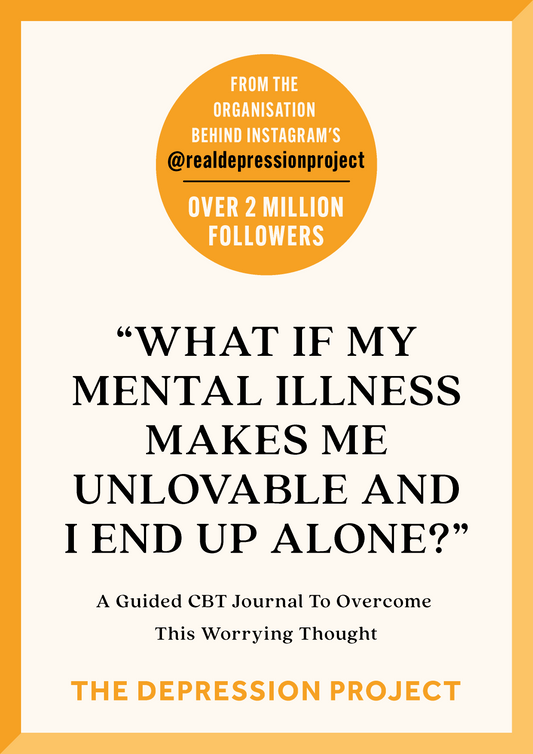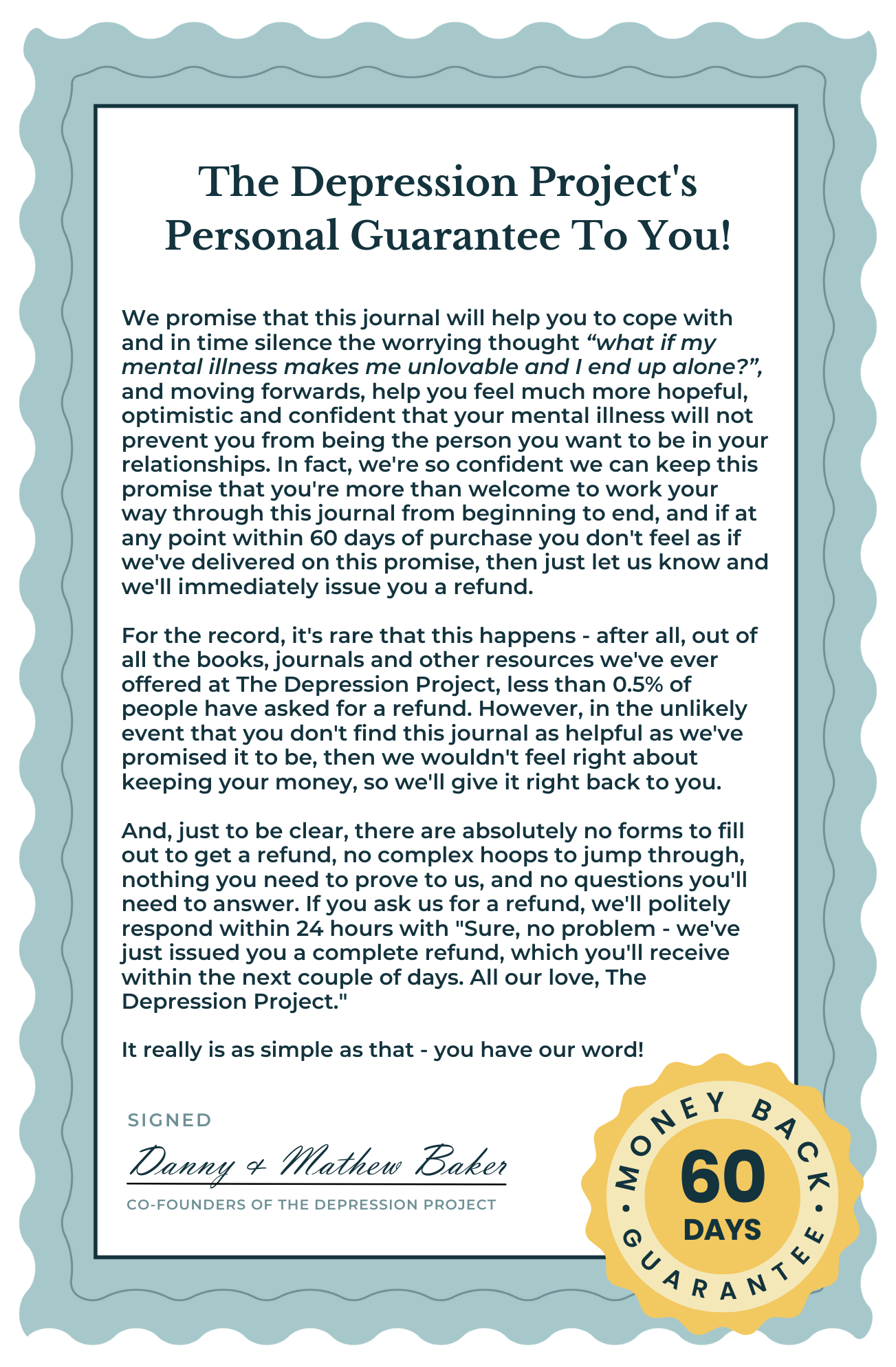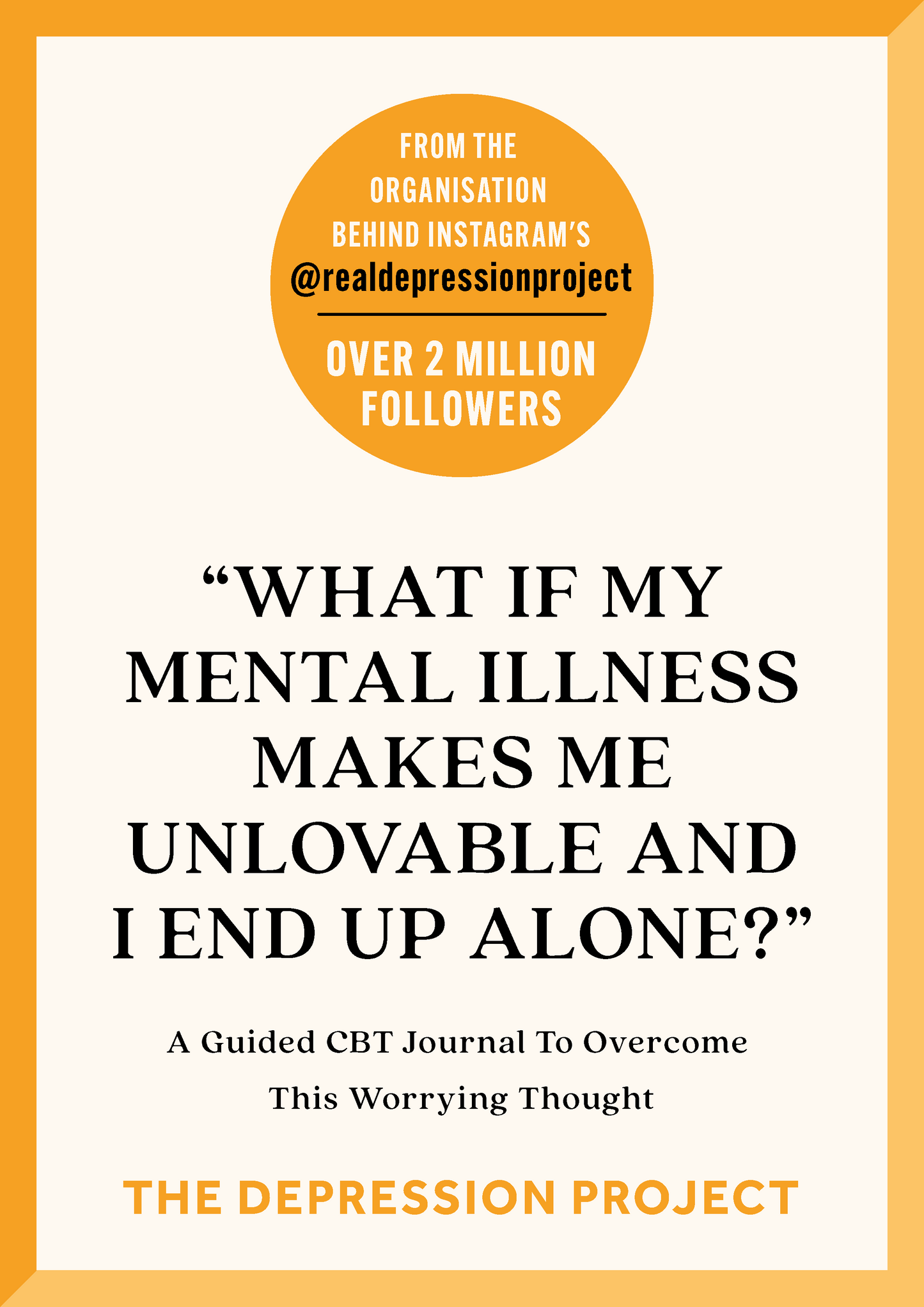
Do you ever worry "what if my mental illness makes me unlovable and I end up alone?"
In early 2022, The Depression Project posed a question to our 3,000,000+ person social media community:
What are the most common “what if ... ?” worrying thoughts that you experience?
Thousands of people responded, and one of the most common worrying thoughts people mentioned was:
“What if my mental illness makes me unlovable and I end up alone?”
Unfortunately, this can indeed be a very natural worry for people with depression, anxiety and/or other mental illnesses to experience – often because, according to members of The Depression Project’s community:
- When you have a mental illness, it’s common to feel as if you’re not as “fun to be around” as you would otherwise be;
- It’s common to feel as if you’ve become a burden, and that your mental illness is dragging your loved ones down and putting a damper on their lives;
- It’s common to find it extremely difficult to control your emotions when you’re battling a mental illness, and as a result, it’s common to accidentally snap at loved ones when they don’t deserve it.
If you can relate, then we’re really glad you’ve found this journal, because in the pages that follow, we’re going to help you cope with and in time silence the worrying thought “what if my mental illness makes me unlovable and I end up alone?” – so that, moving forwards:
- This worrying thought doesn’t continue to haunt you and make you feel even worse;
- You feel much more hopeful, optimistic and confident that your mental illness will not prevent you from being the person you want to be in your relationships.
Here’s A Breakdown Of Exactly What This Journal Will Cover
PART 1: Bringing More Awareness To The Lovable Things About You
"Filter thinking" is where you focus on only one particular aspect of a situation, and filter out all of the other aspects. And, when it comes to the worrying thought “what if my mental illness makes me unlovable and I end up alone?”, what you’re likely doing is:
- Focusing on the impact your depression / anxiety / PTSD / another mental illness is currently having on your relationships (which you perceive to be negative);
- And, at the same time, you’re filtering out some or all of the lovable things about you.
Consequently, in order to cope with and in time silence the worrying thought “what if my mental illness makes me unlovable and I end up alone?”, it’s really important that you stop thinking with such a negatively biased filter, and instead start looking at things through a much more balanced lens. And, to help you do this, in Part 1 of this journal, we'll share a variety of journal prompts with you to help you identify and shine a light on some of the lovable things about you that right now, you're likely not aware of.
PART 2: Helping You Get On The Right Track To Recovering From Your Mental Illness
When you’re worryingly thinking “what if my mental illness makes me unlovable and I end up alone?”, implicit in this worrying thought is the fear that your mental illness is going to get worse and worse over time – or at the very least, that it’s never going to get better – and that as a result, it will continue to negatively impact your relationships until everyone leaves you and you’re all alone.
Consequently, in order to cope with and effectively silence the worrying thought “what if my mental illness makes me unlovable and I end up alone?”, it’s essential that you feel hopeful and confident that rather than your mental illness continuing to get worse and worse over time, it’s instead going to get better – and that as a result, you will be able to become more and more like the person you want to be in your relationships.
On that note, in Part 2 of this journal, we'll share a variety of journal prompts with you in order to:
- Help you identify and see the reasons why, moving forwards, your mental illness can indeed get better over time;
- Help you put together and implement your own step-by-step action plan that you can follow to get better as well.
PART 3: Minimising The Impact That Your Mental Illness Is Currently Having On Your Relationships
In the third part of this journal, we'll share with you a wide variety of strategies to help you minimise the negative impacts that your mental illness may be having on your relationships. Additionally, we'll also share with you some accompanying journal prompts to help you think about how you can effectively put these strategies into practice as well.
FAQ #1: Why should I be confident this journal will help me?
This journal is grounded in cognitive behavioural therapy - which in case you don't know, is a leading form of treatment for anxiety, panic attacks, phobias, depression, personality disorders, and a wide range of other mental health issues.
Additionally, this journal is also written with the warmth, care, encouragement and insight that, with 3,000,000+ followers on social media, The Depression Project has become renowned for :)
FAQ #2: What format does this journal come in?
This journal is available in two different formats for you to choose from:
- PDF - which you will be able to download instantly after purchase, and then print out at your home, office or local printer.
- Paperback (if you live in the US or Canada) - which will be delivered to you within 4-8 business days. Shipping costs are US$7.95 within the US and CAD$14 within Canada. This shipping cost is a flat rate, so whether you order one journal, or multiple journals, the shipping cost will be the same (if you would like to, you'll find the option to add one or more other journals to your cart below so that you can save on shipping). Once your order has been shipped, you will be emailed a number so that you can track it.
FAQ #3: What if I give this journal a try but I don't like it?
We're extremely, extremely confident that you're going to find this journal immensely helpful. But, just in case you don't, the PDF version of this journal comes with a 60 Day, No-Questions-Asked, 100% Moneyback Guarantee!

If you have any questions about this journal, then please feel free to click here and contact us so that someone from our friendly team can answer them for you :)
Otherwise, we hope you choose to get this journal, because we know that you're going to find it really, really helpful!
All our love,
The Depression Project Team.
Format Options

